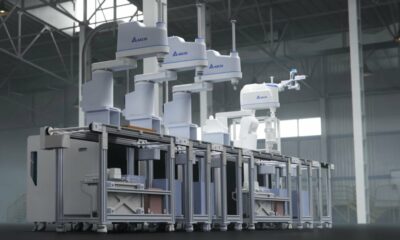Norway’s central bank recently announced that it will begin the technical testing of a central bank digital currency (CBDC). The country has been researching this idea for over four years and says testing could take at least two more years. As one of the world’s most cashless economies, a digital currency could move the country one step closer towards eliminating the use of physical cash.
But Norway is not the only country toying with the idea of a CBDC. The growth of cashless payments has made our personal data more easily accessible and CBDCs would further enhance the reach of governments. This is potentially dangerous for civil liberties across the world. Cash is the only means of payment that does not provide governments and private companies with data about our financial transactions and spending habits.
Cashless Payments Create Data
Cashless payments provide a certain convenience for users, but they are also gold to private companies and governments. Each transaction creates data that companies use to target advertising, decide if someone should receive a loan or determine how high to set insurance premiums. Some believe that since they have nothing to hide, this is no big deal. But this collection of personal data is an infringement on people’s right to privacy.
Government officials that want access to a citizen’s financial transactions typically need to submit a formal request to private companies. This information might include details about donations to opposition parties and financial aid received by protestors. In some countries, sharing such knowledge can be life-threatening.
Under authoritarian regimes, asking for this information is merely a formality as companies have no choice but to hand over data if they want to continue operating in the country. However, it is at least a slight hoop that governments must jump through. But governments, autocratic and democratic, might have found an even more direct way to access financial transactions and spending habits.
Central Bank Digital Currency (CBDC)
Approximately 50 monetary authorities, including the EU and the U.S., are currently exploring the idea of developing a national CBDC. In October 2020, the Bahamas became the first country to introduce digital money. With this type of digital currency, people deposit money to an account with a central bank and make digital payments using an app or online payment platform resembling Venmo or Alipay.
This essentially cuts out private banks and eliminates the risks associated with financial institutions (think, the 2008 financial crisis), but CBDCs come with different dangers. Putting online banking in the hands of the government could give the State free, unfettered access to the personal finances of all its citizens. As John Howland Cochrane, economist and professor at Berkeley, threatens, “With digital money, the government could view any financial transaction and obtain a flow of information about personal spending that could be used against an individual in a whole host of scenarios.”
Most countries probably have good intentions for pursuing a CBDC. Others, particularly autocratic countries, might be looking for another way to control and track citizens. Regardless of the intentions, civil liberties are at risk.
China Takes the Lead
China is the first major economic power to begin testing a central bank digital currency (CBDC). The Chinese Communist Party (CCP) first began pursuing a digital currency in 2014, claiming that it would be a better option for cashless payments since transactions could be conducted offline via Bluetooth. The CCP has rolled out ambitious testing in major cities this year and has hosted lotteries with prizes paid in the new e-yuan. As of last month, the digital yuan, or e-yuan, has 500,000 trial users. Goldman Sachs estimates that within the next decade, nearly 1 billion people could be using e-yuan, but Citic Securities believes it will take at least several years for the digital currency to replace only 10% of China’s physical cash.
Most importantly for the CCP, the e-yuan adds an additional tool to the surveillance techniques already used to track its citizens’ every move. The Washington Post reports that this centralized digital currency would create “the world’s largest repository of financial transactions data, allowing the authoritarian CCP unprecedented access to ramp up surveillance of ordinary citizens.” This threatens civil liberties as financial transactions would be under CCP control, enabling them to sanction or freeze the accounts of activists or dissidents at-home or living abroad.
The CCP could also require foreign companies or investors to use a certain percentage of e-yuan for transactions, thus giving them eyes on commercial dealings. Or the digital yuan could be used to avoid U.S. sanctions and provide financial support to other internationally sanctioned regimes. China’s plans for a CBDC are underway and pose a new threat to human rights and civil liberties within, and outside, the country’s borders.
Protecting Cash Protects Civil Liberties
As Asian startup specialist, e27, observes, “Cashless economies, where transactional data is digitally recorded and accessed by companies and governments unbeknown to the users, is becoming a serious infringement on our basic privacy rights.” Indeed, cashless payments and CBDCs generate data that governments and companies use to control and shape society through propaganda, advertising and surveillance.
With this collection of information, cash remains the safest form of money and is the only transaction that is actually anonymous. As governments across the world use surveillance on citizens, Cashless Economy argues that, “Cash remains the only economic medium to guarantee complete privacy and protection from governmental abuse.”
Modernity Means Options
CBDCs have been hailed as the modern version of cash, but modernity does not mean we need to abandon our right to privacy and the protection of our civil liberties. Contrary to what financial institutions and some public officials want you to believe, cash is not antiquated and still has its place in today’s economy.
Technological advances are useful because they provide additional options without necessarily eliminating more ‘traditional’ methods. Owning a microwave does not mean people no longer use stovetops. Each has an appropriate time for being used – as is the case with cash and cashless payment options. As The Economist notes, “For years to come, central banks will continue to provide banknotes alongside e-wallets, recognising that many people still want to hang onto hard cash or are simply unable to use smartphones.”
CBDCs have advantages, as do other cashless payments, but cannot be the only options. Many people are uncomfortable knowing that private companies can sell information about which vacuum or dish soap they prefer and that governments know which political candidate they donated to. Cash is the only option that provides anonymity and the comfort that Big Brother is not tracking your every move. Protecting the right to use cash means protecting our civil liberties.

 Technology4 weeks ago
Technology4 weeks ago
 Technology3 weeks ago
Technology3 weeks ago
 Business4 weeks ago
Business4 weeks ago
 Technology3 weeks ago
Technology3 weeks ago
 Business4 weeks ago
Business4 weeks ago
 Technology4 weeks ago
Technology4 weeks ago
 Technology4 weeks ago
Technology4 weeks ago
 Technology3 weeks ago
Technology3 weeks ago


